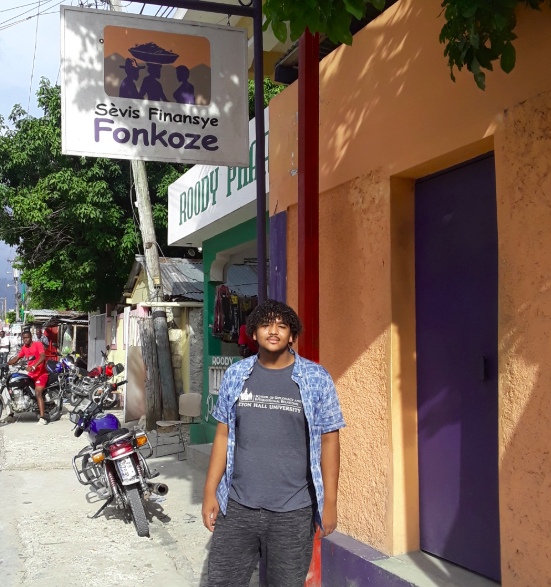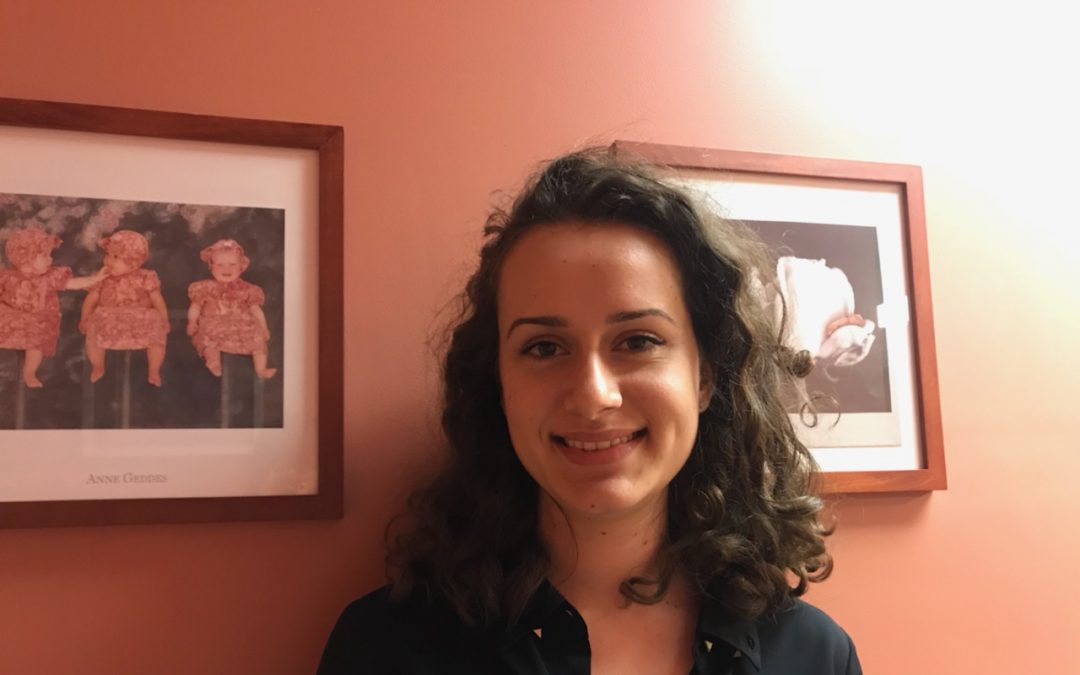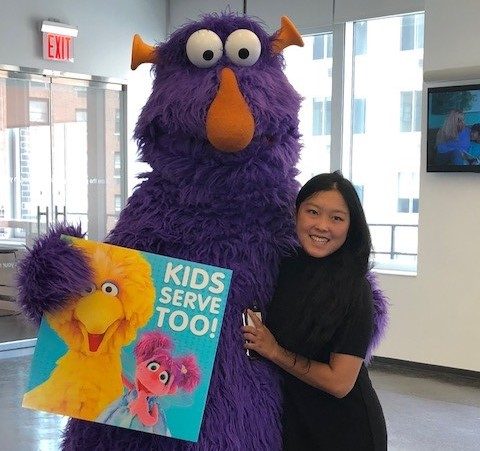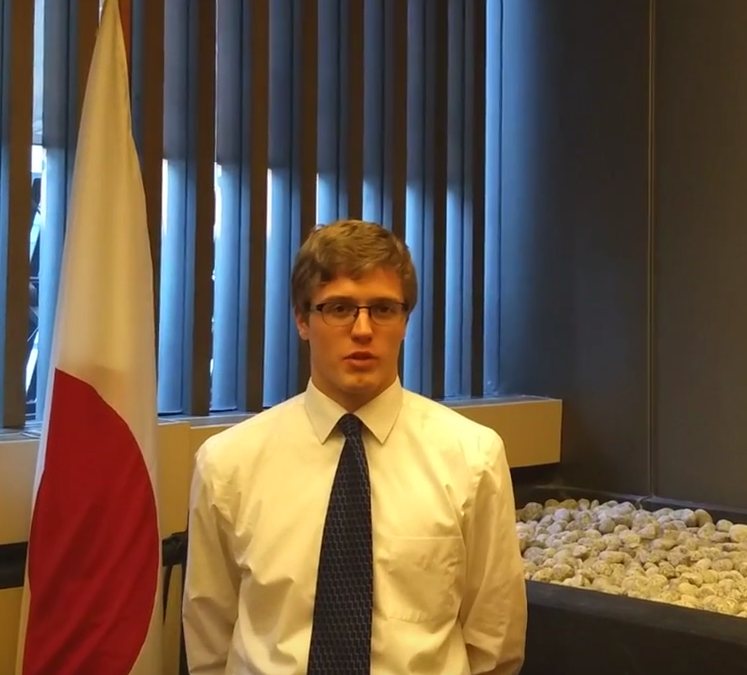
by Madison McHugh | Nov 9, 2018 | Internship Experiences, Undergraduate Students
My name is Kenneth Saint Preux, and I am a junior in the Diplomacy and International Relations program at Seton Hall. Over the summer, I interned in Mirebalais, Haiti for an organization called Fonkoze, an NGO that works to alleviate poverty in Haiti. I interned in their CLM (Chemen Lavi Miyò) program. Chemen Lavi Miyò means “Pathway to a Better Life”. This phrase embodies the program’s goals. CLM’s goal is provide services and empowerment to low-income women across the central plateau region of Haiti. My responsibilities included accompanying case managers to various sites to research and assist on project implementation while managing participants.
Working with an NGO in a developing state gave me access to knowledge that most people would not be able to obtain. Fonkoze gave me an opportunity to better understand the issues that are plaguing Haiti. By understanding these various issues, I am also learning more about the foreign policy of Haiti. Haiti lacks many resources and depends on aid from the U.S. and trade with the Dominican Republic. The Haitian Government’s reliance on aid and trade allows for the poverty issue in Haiti to be exacerbated to the point where it is almost impossible to find “the poorest of the poor” in Haiti.
My coursework has helped during this internship as many of the challenges I encountered came from the cultural differences between the staff and participants. My Cross-Cultural Negotiation and Conflict Management course helped significantly with my communication skills. As I have learned throughout my studies, interacting with those of other cultures is a key component to the art of diplomacy and becoming a practitioner in the field. Another class that helped me with my internship was my Institutions of Global Governance class, teaching me about the functionality of NGOs across various developed and developing nation-states. NGOs play a significant role in Haiti, as they provide services that the Government of Haiti cannot provide. Fonkoze is such an example. The last course I will mention that helped in this internship was my Sustainable Development class, which taught me how nation-states could grow and prosper while also stressing the intersectionality of poverty and economic development. Poverty is not an issue that just simply disappears over time or periods of growth; solutions require massive amounts of effort and research. This connects to my current work, as Fonkoze focuses its efforts on female-headed households, due to their usually being the most fragile of these families under “extreme poverty”.
I would recommend Fonkoze to students interested in gaining experience in the development field. Fonkoze is a great organization that will send you to a place that truly needs help. Fonkoze gives students the opportunity to see a successful NGO in a developing state.

by Madison McHugh | Oct 25, 2018 | Internship Experiences, Undergraduate Students
My name is Zofia Gallegos, and I am a senior Diplomacy & International Relations and Spanish double major. In Spring 2018, I was the Economic Empowerment Intern at the International Rescue Committee (IRC) in Elizabeth, NJ. Coming from a family of immigrants, I was always interested in immigration issues and laws governing immigration to the United States. I knew I would be a good fit for an organization like the IRC, which is dedicated to helping people that have just moved to the country to establish themselves and build their lives in the U.S.
While interning at the IRC, I met many different people from diverse backgrounds. Our clients ranged from middle-aged parents looking to provide a better life for their families, to teenagers and small children who moved to the U.S. and look for guidance towards understanding and becoming accustomed to American culture.
Day to day, my work varied greatly, but I always completed case notes regarding our clients and their developments into ETO software. My fellow interns and I also assisted with career development services or job searches on behalf of our clients. Career development might include learning about a client’s education, skills, and past work experience to determine what type of job he or she would be a good match for. Oftentimes, we helped clients obtain more information about a particular career path that they were pursuing, or we informed them of available job opportunities in the area. We utilized job search engines to look for jobs that would fit their salary needs and qualifications. In addition, I participated in team meetings to discuss the current issues, advancements, and concerns in our department. At these meetings, we discussed what we had accomplished over the week, what our challenges were, and something that we had successfully achieved.
My biggest challenges interning at the IRC were language and cultural barriers. Language barriers are self-explanatory; many times, our clients had recently arrived to the U.S. and had only begun the process of learning the English language. Other clients who came from the Middle East or the Caribbean region also required more attention since I only understand English, Spanish and Polish. Interpreters were typically available to translate, but I would make the attempt as well. Ultimately, I was able to turn my challenges into strengths by engaging with IRC clients in an open and friendly manner and having the patience to understand and communicate. I am happy to have had the opportunity to work with the IRC, and their goals to aid those entering America as immigrants are very much aligned with my long-term goals to help those in similar circumstances. I would recommend an internship with the IRC as you meet a host of incredible people, and the role allows you to learn essential skills in communication.

by Madison McHugh | Aug 20, 2018 | Internship Experiences, Undergraduate Students
My name is Kylie, and I am a senior Diplomacy and Modern Language major with a minor in Economics. I interned in Sesame Workshop’s Philanthropic Development Department. Sesame Workshop is the umbrella nonprofit educational organization that produces Sesame Street, which is far more than just the show. The organization works in 150 countries and has initiatives that range from dealing with grief for families of military personnel in the US to performing outreach for those affected by HIV in South Africa. I was drawn to this internship by Sesame’s creative approach to tackling difficult community issues worldwide, and I wanted to pursue my interest in education at a large organization.
My responsibilities included research, filing, inventory, team meetings, and mail management. Although the work wasn’t always glamorous, Sesame interacts with incredible people and entities, from Priscilla Chan to the Canadian government, which allowed me many opportunities to network. I also completed two major projects during my time at Sesame: the first was completing research for Sesame’s 50th anniversary next year, and the second was labeling production documents and plans from the Bangladeshi program’s ninth season production and education initiative. These projects allowed me to embrace the “insider’s view” and appreciate the kind of attention that goes into various initiatives.
Interning at Sesame showed me that nonprofits in education are an exceptional pathway to making a difference, even if it is not as flashy as counterterrorism or cybersecurity. In addition, I realized the intersection of elementary education and diplomacy as Sesame’s programs seek to simplify universal values and international issues to a level that children can internalize. Their goal is not to teach the statistics and policy, but to teach understanding and acceptance. They are instilling habits for children that lead to better lifestyles. It’s not just about learning the alphabet and numbers, but learning about the respect needed to heal divides in the ethnically and religiously diverse streets of Isreal (Rechov Sumsum) or to empower girls in Nigeria (Sesame Square). Many children in countries that Sesame Street airs in obtain their primary education through the show due to conflict, poverty, or the lack of a school system.
My time at Sesame was an amazing experience that taught me the dynamics of how large offices work and the responsibilities of various departments. As an intern, I completed informational interviews with department heads, and my last semester project included researching part of the department to make suggestions on improvements or initiatives. My project on the Yellow Feather Fund included marketing and development strategies to increase the reach of the fund, and this allowed me to explore business ideas outside of my field of interest.
Overall, I would recommend this internship or any other internship within Sesame, as the office is a welcoming environment and one dedicated not only to educating the public but enriching its interns with new experiences and ideas.

by Madison McHugh | May 3, 2018 | Internship Experiences, Undergraduate Students
My name is Trevor West, and I am a junior at Seton Hall University majoring in International Relations & Diplomacy, Modern Languages (Japanese/Chinese), and Philosophy. I am currently interning at the Japan Society Language Center in New York City, a non-profit organization founded after World War II.
I have a long-standing interest in the Japanese language and culture, reaching back to my childhood and early exposure to Japanese pop culture through anime, video games, and music. I pursued these interests further and began studying the language in hopes of being able to understand and experience more aspects of the culture. The Japan Society is a great organization that helps individuals to learn Japanese as well as appreciate the vast richness of both ancient and contemporary Japanese history, art, and more.
The essential tasks I complete at the Language Center include a variety of administrative work, such as: communicating with clients, registering students for classes, and managing the student information database by adding and updating information. I also interact with staff and see the living process of a school-system. My internship relates to my international relations curriculum as I am experiencing how a non-profit operates and meets its goals.
This internship has been a first-hand look into a system that, until now, my classes have only focused on in the abstract aspects. The mission statement of the Japan Society, with its goal to deepen “mutual understanding between the United States and Japan in a global context” appears abstract until put into practice. The Language Center’s practice fulfills this deepening of mutual understanding by facilitating classroom experiences, and my responsibility is to ensure that interested individuals receive excellent service. These individuals will learn from the courses and further their understanding of the Japanese language and culture, and the Japan Society will be one step closer to their goal of expanding U.S.-Japan relations.
My internship with Japan Society has been a humbling experience and shown me how amazing NGOs are in practice. It is one thing to learn about organizations, institutions, governments, or any other complex topic in the classroom, but actually working and getting to know the feeling of how an organization functions is different. The internship has given me practical knowledge that the classroom has not precisely because physical experience helps one to grasp the abstract concepts learned in the day-to-day functioning of an organization.
This internship is exciting because it is an opportunity to see the real-life application of what I have learned so far in my classes. While the skills I use daily are relatively basic, interning at the Language Center has given me a way to connect with others who are influential in promoting deeper U.S.-Japan relations and allowed me to give back and participate in the mission. Thus, the best part of this internship is the happy union between what I have learned in class and the tangible functioning of Japan Society as well as the opportunity to further U.S.-Japan relations.




